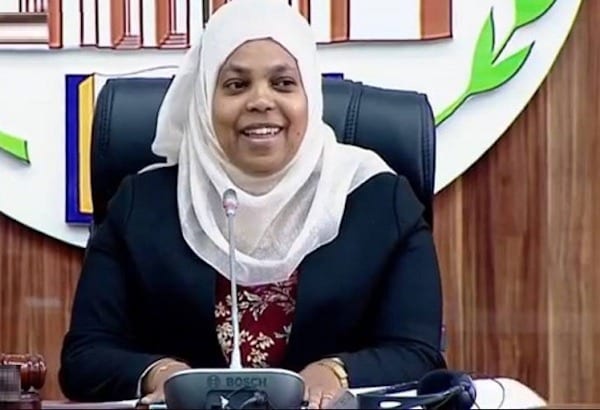In pursuit of peace and stability in his country, Ethiopia’s Prime Minister Abiy Ahmed has managed to do what very few around the world have done: appoint a Cabinet that’s half female.
The reshuffle comes as part of extensive reforms across the country, and sees women appointed to 10 of the 20 Cabinet roles. Abiy said that women are “less corrupt than men” when explaining the overhaul.
“Our women ministers will disprove the old adage that women can’t lead,” he told Parliament. “This is to show respect to the women for all the contribution they have made to the country.”
A number of women have been appointed to leadership positions for the first time in history during the reshuffle, including Aisha Mohammad, who becomes Ethiopia’s first female defence minister.
The new Cabinet also includes two Muslim women who wear headscarfs, which analysts say sends an important message of inclusion, given Ethiopia is one-third Muslim.
Seven months into the job, Abiy has quickly become known for his extensive and fast-moving reforms across the country. He has released thousands of prisoners, reached out to a number of rebel groups, made peace with neighbouring Eritrea, and outlined an extensive reconciliation policy. He has also promised to open up the economy, along with free and fair elections by 2020.
Abiy’s roadmap of reforms, which includes this push for more women in leadership, comes as Ethiopia is currently seeing significant ethnic violence resulting in more than 1.4 million people displaced in the past year.
As such, Abiy has also created a new peace ministry, led by Ethiopia’s first female speaker of Parliament, Muferiat Kamil (pictured above), leading Africa News to ask if she is now the most powerful woman in the country.
Incredibly, just over a week ago there were fears of a coup, after dozens of armed soldiers approached Abiy’s residence demanding pay rises. The soldiers were invited inside, without their weapons, and were able to meet with top officials. Abiy was later photographed doing push-ups with the soldiers.
Abiy had previously been questioned by legislators for his lack of women in the Cabinet, which he had promised to address back in April. This latest shuffle actually saw a reduction in ministry positions from 28 to 20, rather than widening the Cabinet in a bid to promote gender equality.
He said given the precarious nature of democracy in a country made up by numerous ethnic groups, that: “Inclusiveness and coexistence is critical in Ethiopia because of differences in terms of tribalism, and religion and the virtually feudal system of land ownership which prevailed in the past.”
Ethiopia’s new Cabinet has been compared to that of Rwanda, where women have been holding key leadership roles for a number of years and the country has seen significant progress on economic growth, stability and stamping out corruption. Women hold 64% of parliamentary seats in Rwanda, far surpassing a 30% quota set in 2003 reserving seats for women.
Ethiopia’s Cabinet also matches the “gender-balanced” cabinets unveiled by Canadian Prime Minister Justin Trudeau, French President Emmanuel Macron, and Spain’s Pedro Sánchez earlier this year.
Trudeau famously explained at the time that women held half the roles in his Cabinet “because it’s 2015”. For Ethiopia, it appears to come down to something much more pressing: the need for reform and peace.
While the country still has many challenges ahead, it’s clear its new leader sees women as a key part of creating stability.


